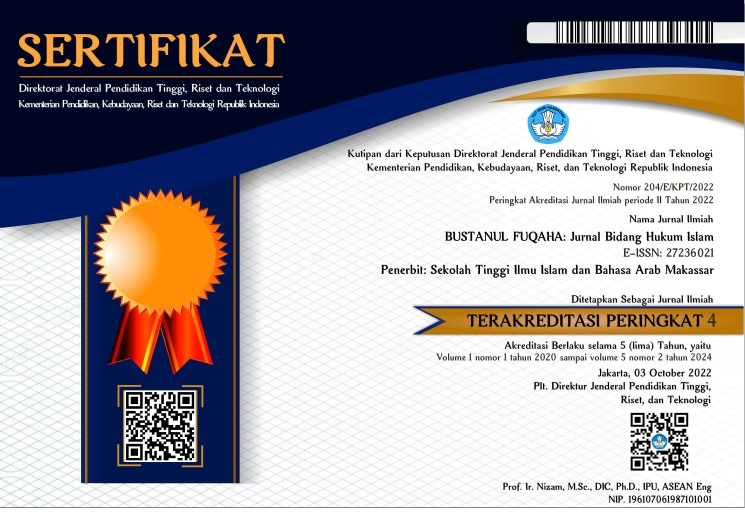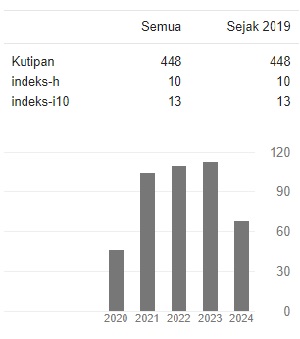Pertimbangan Sosiologis Hukum Islam terhadap Penolakan Pornografi di Indonesia
Sociological Considerations of Islamic Law on the Rejection of Pornography in Indonesia
DOI:
https://doi.org/10.36701/bustanul.v3i3.660Keywords:
pornography, Islamic law, sociological considerationsAbstract
This study aims to determine the sociological considerations of Islamic law against the rejection of pornography in Indonesia. The method and type of research used is descriptive-qualitative research. The results of this study indicate that showing pornography on social media that is easily accessed and watched continuously by someone will have an impact on the rise of adultery, rape, and even murder, as well as various other negative effects. According to Islamic law, pornography is expressly prohibited and is an unlawful act. This can be seen in the Al-Qur'an surah al-Nur/24: 30-31, namely the command to guard the genitals or honor. Likewise in the Al-Qur'an surah al-Isra'/17: 32 regarding the prohibition of approaching adultery and the punishment for adultery in the Al-Qur'an surah al-Nur/24: 2. In Islam, pornography is equated with adultery or serious adultery . Pornographic crimes are not regulated directly by law. Therefore, law is adopted from classical law by adopting law based on existing texts and laws.
Downloads
References
Firdaus Syam. (2010). Analisis dan Evaluasi Undang-undang Nomor 44 tahun 2008 tentang Pornografi. Jakarta: Kementerian Hukum dan Hak Asasi Manusia RI Badan Pembinaan Hukum Nasional.
Neng Djubaedah. (2009). Pornografi dan Pornoaksi Ditinjau dari Hukum Islam. Cet.III. Jakarta: Kencana
Departemen Pendidikan Nasional. (2005). Kamus Besar Bahasa Indonesia, edisi III. Jakarta: Balai Pustaka
Yandi Maryandi. (2018). Pornografi dan Pornoaksi (Perspektif Sejarah dan Hukum Islam). Tahkim, Jurnal Peradaban dan Hukum Islam. Vol.1 No.1 Maret, 21-40
Departemen Agama RI. (1992). Ensiklopedi Islam, di bawah kata Aurat. Jakarta: Depag RI.
Suparman Usman. (2002). Asas-asas dan Pengantar Studi Hukum Islam dalam Tata Hukum Indonesia. Cet. II. Jakarta: Gaya Media Pratama.
Sudirman Tebba. (2003). Sosiologi Hukum Islam. Cet. 1. Yogyakarta: UII Press.
Sutrisno Hadi. (2009). Metode Penelitian Pendidikan (Pendekatan Kuantitatif, Kualitatif dan R&D). Bandung: Alfabeta
John Leksi Moleong. (2013). Metode Penelitian Kualitatif. Edisi Revisi. Bandung: PT. Remaja Rosdakarya.
Hanafi Pelu & Muh. Zainal. (2022). Komunikasi Interaktif melalui Metode Cas-Cis-Cus. Jurnal Ilmiah Nizamia Jurnal Pendidikan, Sosial, dan Agama Volume 04, No. 2, April, 171-177
Neng Djubaidah. (2013). Tinajauan Undang-Undang Republik Indonesia Nomor 44 Tahun 2008 Tentang Pornografi, disampaikan pada Rapat Terbatas: Penanganan Pornografi. Jakarta: Dewan Pertimbangan Presiden
Haryatmoko. (2007). Etika Komunikasi. Cet, X. Yogyakarta: PT Kanisius.
Downloads
Published
Issue
Section
License
Copyright (c) 2022 Luthfi Bakence, Kurniati Kurniati, Misbahuddin Misbahuddin

This work is licensed under a Creative Commons Attribution-NonCommercial-ShareAlike 4.0 International License.














